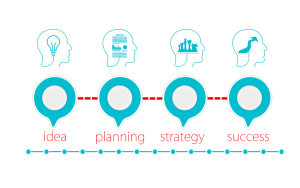Procrastination is universally associated with negative outcomes.
Whether it is increased levels of stress or decreased financial stability, nearly all procrastinators display the many inefficiencies of this habit.
Those who procrastinate also tend to develop poor time management skills, leading to even more unpleasantness.
As someone concerned with your future and happiness, can you avoid the dreaded trap of chronic procrastination? Thankfully, most scientists agree you can take proactive measures to stop procrastinating. One powerful approach is to understand and leverage your innate strengths. The HIGH5 strengths test can help you identify your unique strengths, providing you with a personalized foundation to combat procrastination effectively. By aligning your tasks with your natural talents, you can increase motivation and productivity, making it easier to overcome the urge to procrastinate.
Better yet, you can take measures to never start in the first place. If you do so, you will save time, energy, and even money while working to improve your future.
This article will give you a clear overview of procrastination: its definition, how to combat it, and the many positive consequences of stopping procrastination.
What is Procrastination?
Procrastination is when you put off important tasks that you internally know need to be worked on. Typically, this results in you finishing work past the deadline.
Many psychologists believe a lack of self-regulation is one of the main drivers of procrastination. Procrastinators understand the rational reason to work on the task.
Yet, they delay performing it even when aware of potential negative consequences.
A significant portion of the US population is procrastinators. Data from DePaul University in Chicago estimates that 20% of Americans are procrastinators.
While many associate procrastination with laziness, this is not a fair comparison. Even organized and dedicated individuals can find themselves procrastinating from time to time. The key to overcoming procrastination often lies in understanding your unique strengths and how to apply them effectively. The HIGH5 strengths test can reveal your top five strengths, providing insights into how you naturally approach tasks and challenges. By leveraging these strengths, you can develop personalized strategies to combat procrastination, turning potential weaknesses into opportunities for growth and productivity.
There are endless reasons to stop procrastinating, for procrastination is not regarded negatively for no reason.
If you procrastinate in your daily life, you may find yourself making less money, not achieving your goals, or generally feeling dissatisfied.
Pro Tip From HIGH5
Harness your HIGH5 strengths to combat procrastination. If you’re strong in ‘Strategic Thinking’, use it to break down large tasks into manageable steps. If ‘Developer’ is one of your top strengths, set small, frequent goals to maintain momentum and satisfaction in your progress.
Procrastination Causes & Where They Appear Most
There is no universal cause of procrastination. Often, mental health conditions and personality play a role. Other times, someone’s current situation leads to a lack of motivation and procrastination. However, understanding your unique strengths can provide a powerful counterbalance to these factors. The HIGH5 strengths test offers valuable insights into your natural talents and how they can be applied to overcome procrastination. For instance, if you have a strength in ‘Problem Solver’, you can approach tasks as challenges to be conquered rather than burdens to be avoided. By aligning your approach with your innate strengths, you can create a personalized strategy to combat procrastination effectively.
If someone is fired, for example, they are less likely to feel empowered about their career and personal life. Thus, they may neglect important tasks. Additional causes of procrastination include:
Academics
Students are more likely to procrastinate when compared to the general population.
One 2007 meta-analysis found that between 80% and 95% of college students consistently procrastinate, especially when it comes to school work.
Certain personality and environmental factors contribute to student procrastination.
This includes poor planning, poor time management, overestimating motivation, underestimating the time certain tasks take, and immediately believing they will understand an assignment.
Depression
Depression is another key contributor to procrastination.
Those who are depressed have less intrinsic motivation, often feel hopeless, experience more negative emotions, and simply lack the energy necessary to perform unpleasant tasks.
The lack of self-esteem many depressed people have also contributed to high rates of quitting after starting tasks.
Insecurity and hopelessness often make people put off tasks, even when they understand the consequences of doing so.
Obsessive-Compulsive Disorder (OCD)
If you have OCC, you are more likely to procrastinate. This is because people with this disorder often have a fear of failure and take perfectionism to an unhealthy extreme.
When these two factors are combined, this leads to increased self-doubt and doubts over how well you are performing daily tasks. People with OCD also often worry about how others perceive them.
The result of all of these factors is a lack of decisiveness, forcing people with OCD to put off making an action plan and avoiding making decisions.
ADHD
In people with attention-deficit hyperactivity disorder or ADHD, procrastination is a common trait. People with this condition find focusing to be challenging.
Even slight distractions or internal stimuli make individuals with ADHD lose track of their thoughts. Thus, concentrating on a task and fully complete it it is a true challenge.
This is especially true of uninteresting or difficult tasks.
Pro Tip From HIGH5
Use your HIGH5 strengths to reframe procrastination triggers. If ‘Empathizer’ is one of your top strengths, consider how completing tasks on time positively impacts others. This perspective can provide the motivation needed to overcome procrastination.
15 Examples of Procrastination
There is more than just one way to procrastinate. Procrastination looks different for students when compared to business professionals or parents.
Nearly all procrastination, however, stems from an inability to focus, low self-esteem, or not being able to set clear goals. A few examples of procrastination include:
- Putting off projects or homework until the due date (academic procrastination).
- Submitting assignments at the last minute.
- Wasting time on social media or watching television before work is done.
- Failing to pay monthly bills on time.
- Avoiding yearly checkups at the doctor or bi-yearly dental checkups.
- Reading about a possible diet change, but failing to start a new regime.
- Never asking a guy or girl on a date out of fear of rejection.
- Waiting for the best moment to switch your career or start a new business, only to realize that moment will never come.
- Quitting a bad habit, such as smoking, vaping, or unhealthy eating.
- Not saving for your retirement or your child’s college fund.
- Failing to clean the house or take care of your hygiene.
- Valuing unimportant chores over more important (but also more difficult) tasks.
- Staying up late despite having a goal of going to bed early.
- Not committing to spend more time with your spouse or children.
- Never finalizing a change to your daily routine.
2 Types of Procrastination
Despite being similar, there are multiple types of procrastination. Regardless, the impact of procrastination is nearly always negative.
Nonetheless, understanding the type of procrastinator you are can help you overcome your issue more effectively.
Researchers find that procrastinators fall into one of two categories.
Passive procrastinators
This type of procrastinator struggles with being decisive. If you cannot make a decision, it is difficult to follow through with your goals and accomplish tasks.
In fact, many passive procrastinators never outline a plan for how to accomplish a task. They are more likely to rely on their motivation to propel them into action.
Unfortunately, this is not an effective way to combat long-term procrastination.
Active procrastinators
This type of procrastinator uses their procrastination to their advantage (or so they believe).
These individuals believe that waiting until the last minute gives them additional, energy and motivation to compete a task. They typically work well under pressure and enjoy feeling challenged.
However, they could also forget about tasks and never complete them if they do not actively remind themselves. In general, this type of procrastinator has more success than its passive counterparts.
They are purposefully delaying tasks and find benefits in this approach.
Behavioral Styles That are Mostly Affected by Procrastination
Age is not the only factor that affects someone’s likelihood to avoid tasks. Certain personality types and behavior styles are more likely to be procrastinators.
In particular, these behavior types include:
Perfectionist
Perfectionists are more likely to become passive procrastinators than active ones. They have trouble with making decisions and often put off solidifying their choices.
This is so because they wait for the perfect solution to every problem. Their main fear is imperfection. So, they are willing to wait, or even forgo tasks altogether, if it means avoiding imperfect execution.
Dreamer
Dreamers like to think about the big picture. While this is not necessarily a bad trait, it can lead someone to procrastinate.
The main reason dreamers procrastinate is that they struggle with identifying and paying attention to details.
The inability to find details can lead to self-doubt or forgetfulness, as remembering specific due dates is not a dreamer’s strength.
Defier
The defied is someone who thoroughly dislikes authority. They are commonly viewed as rebels. When someone tells them what to do and when to do it, the defier’s natural reaction is to outright reject them.
They will not perform a task that is dictated to them, for they do not want others to be in control of their time. The defier does not have trouble with performing tasks they want to do for themselves.
When it comes to working assignments or favors for their boss, though, the defier procrastinates.
Worrier
Worriers have a fear of the unknown. At all costs, the worrier wants to persevere the status quo and dislikes change.
Because of this, they put off tasks that force them to try something new or go outside of their comfort zone. If a task is something they are familiar with or is a consistent part of their routine, they will not neglect it.
Their procrastination is usually triggered by novelty and change.
Crisis-maker
This behavior type is most associated with the active form of procrastination. They thrive when situations are high-pressure.
When a task is highly intense and they have pressure is put on them, crisis-makers are more motivated to work.
This is why they often create a crisis to help their inner strength flourish and help them perform well.
Overdoer
Overdoers struggle with saying “no.” They take on as many tasks as they can, and sometimes overestimate their ability to complete them. This huge load often makes scheduling difficult for the overdoer.
They may have difficulty finding time to complete any of the tasks they need to finish. This extreme pressure could also make the overdoer never begin a task.
They already know it is impossible to complete everything they volunteered for, so they do not even give effort.
The Negative Impact & Danger of Procrastination
It is no secret that procrastination leads to negative outcomes. Many teachers and bosses warn of the dangers that come with becoming habitual procrastinators.
However, many wonder how pronounced this negative effect is. Unfortunately, the data is clear: the negative impact of procrastination is significant, regardless of age or job.
When you procrastinate with paying your bills, significant financial struggles will follow that. A lack of long-term thinking could also lead to struggles paying for your retirement or a child’s time at college.
Your odds at career, school, or entrepreneurial success also suffer when you consistently procrastinate. Those who are procrastinators are often viewed as lazy people.
This could significantly hurt your reputation.
Mental health also takes a toll when you always procrastinate. You will begin to lose your motivation and passion.
Additionally, your self-esteem will also drop. These negative side effects can change your relationships, career, and levels of happiness.
These are not the only negative outcomes associated with procrastination.
Additional side effects of procrastination include:
- Increased levels of stress and more burnout.
- Losing motivation faster and not achieving your goals.
- Forgetting to complete important tasks.
- Higher burden when it comes to the workplace and social relationships.
- Financial troubles, especially when it comes to excessive spending, not paying bills, or not saving.
- Getting a bad reputation within business and family circles.
- Missing out on potentially life-changing opportunities.
- A drop in your grade and decreased academic performance.
- Higher levels of guilt and frustration could lead to mental health conditions in the long run.
- Increased risk of anxiety and depression.
Strategies & Tips to Avoid Procrastination
Whether or not you complete a task is in your control, and understanding your unique strengths can significantly enhance your ability to take charge. The HIGH5 strengths test provides a comprehensive assessment of your top five strengths, offering invaluable insights into your natural talents and tendencies. Armed with this knowledge, you can develop tailored behavioral strategies that align with your strengths, setting you up for success. For example, if ‘Focus’ is one of your top strengths, you can leverage it to create distraction-free environments and maintain concentration on tasks, effectively combating procrastination.
These effective strategies will boost your motivation and increase your ability to manage time wisely.
These tips include:
Make a to-do list
Making a to-do list can help with scheduling. You are more likely to stay accountable when you have a to-do list. Plus, it can remind you of unfinished tasks.
It also motivates you by showing you the tasks you have already performed. Start by making a realistic list of daily, weekly, and monthly tasks.
Then, place due dates next to each so that you can keep track of your progress.
Take baby steps
Going from being a procrastinator to being fully committed and having excellent time management skills is not very realistic. Try breaking down your goals and being honest with yourself.
Listing major and challenging tasks can make you overwhelmed and more likely to quit. Instead, make your goals manageable and achievable.
Once you complete a task, you will get a boost of motivation and confidence.
Recognize the warning signs
Try to understand what triggers you to procrastinate. Understand which environment, people, tasks, or words make you turn to this bad habit. Then, you can tackle the issue more effectively.
Try to resist the desire to procrastinate when it inevitably comes up. Whenever this feeling arises, remind yourself of the consequences of procrastination and the benefits of overcoming this urge.
Eliminate distraction
Distractions play a major part in making some procrastinate. Ask yourself which noises, people, or objects take your attention away from the tasks you should be working on.
Then, eliminate these distractions from your home if possible. If you cannot, place yourself in a different environment without these distractions.
Also, evaluate if online media (like Instagram or Facebook) plays a role in distracting you.
Consider turning on ‘Screen Time’ so these websites and apps automatically lock after a set time is reached.
Pat yourself on the back
You can build motivation and self-esteem by recognizing your successes. When you complete a task, take time to congratulate yourself.
Genuinely reward yourself for doing something in line with your goals. If you do this enough, your brain will start to associate productivity with rewards and positive emotions.
Thus, procrastination will become less of an automatic response for you.
Pro Tip From HIGH5
Align your anti-procrastination strategies with your HIGH5 strengths. If ‘Believer’ is one of your top strengths, connect your tasks to your core values to increase motivation and reduce procrastination.
Procrastinators vs Non-Procrastinators
There are a number of key distinctions between procrastinators and those who do not procrastinate. Generally, those who procrastinate have lower self-esteem and are more at risk for mental health issues. However, these tendencies can be mitigated by understanding and leveraging one’s strengths. The HIGH5 strengths test provides a powerful tool for self-discovery, helping individuals identify their unique talents and how to apply them effectively. By focusing on their strengths, procrastinators can boost their self-esteem, increase productivity, and develop the positive habits typically associated with non-procrastinators. This strengths-based approach can transform how individuals approach tasks, turning potential procrastination into proactive action.
On the other hand, they could also be better at working under pressure. Below, we provide an overview of the main differences between these two groups of people.
Workplace
In the workplace, procrastinators generally have less motivation. They may not set clear career goals for themselves and thus achieve less than their highly motivated peers.
Their colleagues and bosses may also associate their procrastination with laziness, which negatively impacts their reputation.
Those who procrastinate are more likely to show up late or complete projects late as well.
Non-procrastinators are able to stay focused at work. They are not easily distracted by workplace chatter and meet deadlines consistently. Often, they turn work in early.
They have better time management skills and are generally looked into better by bosses and colleagues.
Relationship
In relationships, procrastinators are more likely to take a slow approach to making big decisions. The timeline between getting to know each and getting married could be quite long.
Additionally, they may put off making decisions such as getting a home or having kids. Procrastinators tend to contribute less to relationships financially, too.
A procrastinator’s lack of self-regulation and control could also lead to some bad habits, such as unhealthy eating or smoking. This could be off-putting to their spouse.
Non-procrastinators tend to be highly conscientious. They care about getting things done in a timely manner. They may create plans with their spouse or set goals.
An example of this could be saving $20,000 for a down payment on a new house. Those who do not procrastinate tend to be more reliable in relationships as well.
When they set a goal, they are likely to follow through, making them trustworthy.
Tasks
Procrastinators are not very disciplined individuals. They may struggle with completing tasks. This does not mean that they find certain tasks unimportant.
Instead, they recognize a task’s importance, but cannot find the motivation to complete it. Other times, they procrastinate purposefully so they can use pressure and stress to their advantage.
Non-procrastinators do not like waiting until the last second to complete a task. They find this stress unnecessary and unhelpful. Instead, they are more likely to have schedules, to-do lists, and goals.
This structure helps them complete their tasks efficiently and in a timely manner.
Pro Tip From HIGH5
Use your HIGH5 strengths to bridge the gap between procrastination and action. If ‘Catalyst’ is one of your top strengths, use your natural ability to initiate action to kick-start tasks before procrastination sets in.
10 Inspiring Quotes Against Procrastination
Some of the most popular entrepreneurs, authors, and actors struggled with procrastination at some point in their lives. When they overcome this negative trait, many hope to inspire others to do the same.
Below is a list of a few quotes that may inspire you to stop procrastinating.
List of 10 Quotes
- “If you believe you can accomplish everything by “cramming” at the eleventh hour, by all means, don’t lift a finger now. But you may think twice about beginning to build your ark once it has already started raining.” – Max Brooks
- “A primary reason people don’t do new things is because they want to do them perfectly – first time. It’s completely irrational, impractical, not workable – and yet, it’s how most people run their lives. It’s called The Perfection Syndrome.” – Peter McWilliams and John-Roger
- “A day can really slip by when you’re deliberately avoiding what you’re supposed to do.” – Bill Watterson
- “We must be diligent today. To wait until tomorrow is too late. Death comes unexpectedly. How can we bargain with it?” – Buddha
- “If you want to get ahead in life, I’ve found that perhaps the most useless word in the world is ‘tomorrow.’” – José N. Harris
- “Procrastination usually results in sorrowful regret. Today’s duties put off until tomorrow give us a double burden to bear; the best way is to do them in their proper time.” – Ida Scott Taylor
- “A task left undone remains undone in two places — at the actual location of the task, and inside your head. Incomplete tasks in your head consume the energy of your attention as they gnaw at your conscience.” – Brahma Kumaris
- “Following through is the only thing that separates dreamers from people that accomplish great things.” – Gene Hayden
- “Begin doing what you want to do now. We are not living in eternity. We have only this moment, sparkling like a star in our hand, and melting like a snowflake.” – Sir Francis Bacon
- “The habit of always putting off an experience until you can afford it, or until the time is right, or until you know how to do it is one of the greatest burglars of joy. Be deliberate, but once you’ve made up your mind – jump in.” – Charles R. Swindoll
FAQs about Procrastination
What exactly is procrastination?
Procrastination is the putting off of tasks up until the moment where you must truly perform them, sometimes even past their deadline. It is the opposite of discipline, self-regulation, planning, organization, and long-term thinking.
Some scientists believe there is a self-regulation deficit in those that consistently procrastinate and ignore the negative consequences of that decision.
Why do we procrastinate?
Some people believe it is easy to simply put off difficult or unpleasant tasks. They may tell themselves that they will finish the task later, but often forget to do this, thus resulting in late work.
Individuals may want to avoid boredom or stress, so they avoid the task. Other problems that could cause someone to procrastinate include: difficulty prioritizing tasks, distractions, and even low self-esteem.
What are the 4 types of procrastinators?
Every person has their own unique reason to procrastinate. However, they can generally be divided into 4 key categories: perfectionists, fun-focused, poor planners, and anxious individuals. Those that are anxious tend to cope with issues and stress by procrastinating.
Poor planners overestimate the time they have to accomplish tasks, misprioritize the tasks, and end up not finishing everything they must accomplish.
Perfectionists allow their perfectionism to get in the way of accomplishing tasks. Finally, fun-focused individuals would simply overlook the task in favor of not being bored and doing more fun activities.






